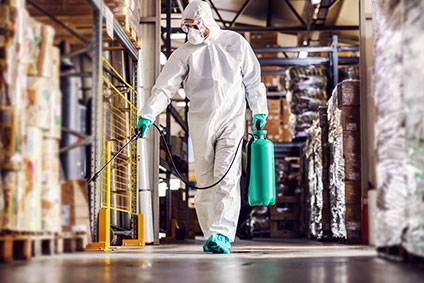
There is consistent under-reporting of Covid-19 cases and deaths from the virus at UK food manufacturing plants, shareholder advisory group Pensions and Investment Research Consultants (Pirc) claims.
London-based Pirc said it reviewed 20 media reports and found there have been 1,461 cases and six fatalities but believes the actual figure is “much higher”. Some 47 positive cases have been reported to the Health and Safety Executive (HSE) up to 8 August – and zero deaths.

Discover B2B Marketing That Performs
Combine business intelligence and editorial excellence to reach engaged professionals across 36 leading media platforms.
Pirc puts the disparity down to a “loophole” in the HSE’s so-called Riddor guidance, or the ‘reporting of injuries, diseases and dangerous occurrences’. According to Pirc, employers are told to “make a judgement, based on the information available, as to whether or not a confirmed diagnosis of Covid-19 is likely to have been caused by an occupational exposure”.
Therefore, companies are instead designating coronavirus outbreaks as cases in the community that have filtered through to the workplace, Pirc claims.
“This shifts the responsibility onto the Government and individuals, and means we have no public records of workforce outbreaks that can be linked to a particular employer. It also reduces the likelihood of sanctions by the HSE,” Pirc said in a report, Food Workers on the Frontline.
“We are concerned that the current regime is resulting in a dramatic level of under-reporting,” the consultancy added, offering a citation from HSE, which states:

US Tariffs are shifting - will you react or anticipate?
Don’t let policy changes catch you off guard. Stay proactive with real-time data and expert analysis.
By GlobalData“Riddor suffers from under-reporting. Not all employers report cases as required under the regulations. However, as there is no reliable estimate of the number of occupational Covid-19 cases, it is not possible to quantify the extent of under-reporting. […]in terms of reporting workplace non-fatal injuries, it is estimated that around half of Riddor reportable injuries to employees are reported to the enforcing authorities (for self-employed the proportion is substantially less). It is likely that disease reporting is lower.”
HSE funding cuts and a split responsibility with local councils means inspections of workplaces during the pandemic have been limited, Pirc claims.
It continued: “The companies we’ve engaged have made it clear they are working with the relevant authorities, including Public Health England. But without information on workplace Covid-19 cases, investors are unable to play a role in supplementing this scrutiny, and supporting good governance over health and safety practices. Investors, some workers and the public at large have little way of knowing when a serious outbreak is occurring – and are left to wait for local media reports to break.”
Pirc also said there are likely to be localised instances of “bad employment practice” due to the severity of the pandemic, adding to the woes of workers already “experiencing vulnerabilities such as low pay, a lack of rights and limited access to union representation”.
Examples referred to by Pirc include: “A reluctance to call in sick due to fear of loss of income; the threat of lost hours and jobs, a requirement to work in large numbers where social distancing is impossible; a lack of adequate PPE across both essential and non-essential work; [and] a lack of corporate transparency over Covid-19 cases and fatalities.”
A spokesperson for UK trade body The Food and Drink Federation said: “Employee health is a top priority for all our companies. Through the last difficult months companies have worked hard to make workplaces Covid-secure, whilst ensuring a secure food supply to keep supermarket shelves stocked.
“In the event of an outbreak, companies have robust measures in place, working with all the relevant authorities to limit the outbreak and to tackle the cause of the transmission, whether that’s from the workplace or within the community.”





